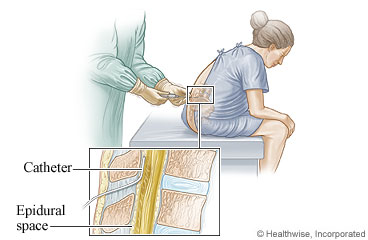Blood Patch Procedure: Care Instructions

Overview
A blood patch procedure uses your own blood to help your headache.
Headaches may happen after certain procedures that involve the spine, such as a myelogram or an epidural for anesthesia. In these procedures, the needle that is used sometimes causes a bit of spinal fluid to leak out of the space around your spinal cord. The leak usually isn't dangerous. But if enough fluid leaks out, it changes the pressure around your spinal cord. The pressure around your spinal cord can also change if fluid is removed for testing during a spinal tap (lumbar puncture). This change in pressure can cause a very bad headache.
To apply a blood patch, first your doctor takes blood from your arm. Then the blood is injected into the area of your lower back where the leak happened. The blood restores the pressure around your spinal cord. It also helps seal any leak that may still be there.
Many people feel better right away, but it could take a day or two. And a few people need to have a second blood patch.
Follow-up care is a key part of your treatment and safety. Be sure to make and go to all appointments, and call your doctor or nurse advice line (811 in most provinces and territories) if you are having problems. It's also a good idea to know your test results and keep a list of the medicines you take.
How can you care for yourself at home?
- For the first 24 hours, return to your regular activities slowly. Avoid strenuous activity.
- If the injection site is sore, put ice or a cold pack on the area for 10 to 20 minutes at a time. Put a thin cloth between the ice and your skin.
When should you call for help?
Call your doctor or nurse advice line now or seek immediate medical care if:
- You have a fever.
- You have a new or worse headache.
- You have a stiff neck.
- You have drainage or bleeding from the puncture site.
- You have tingling, weakness, or numbness in your legs.
- You have trouble urinating or can pass only very small amounts of urine.
Watch closely for changes in your health, and be sure to contact your doctor or nurse advice line if:
- You do not get better as expected.
Current as of: July 31, 2024
